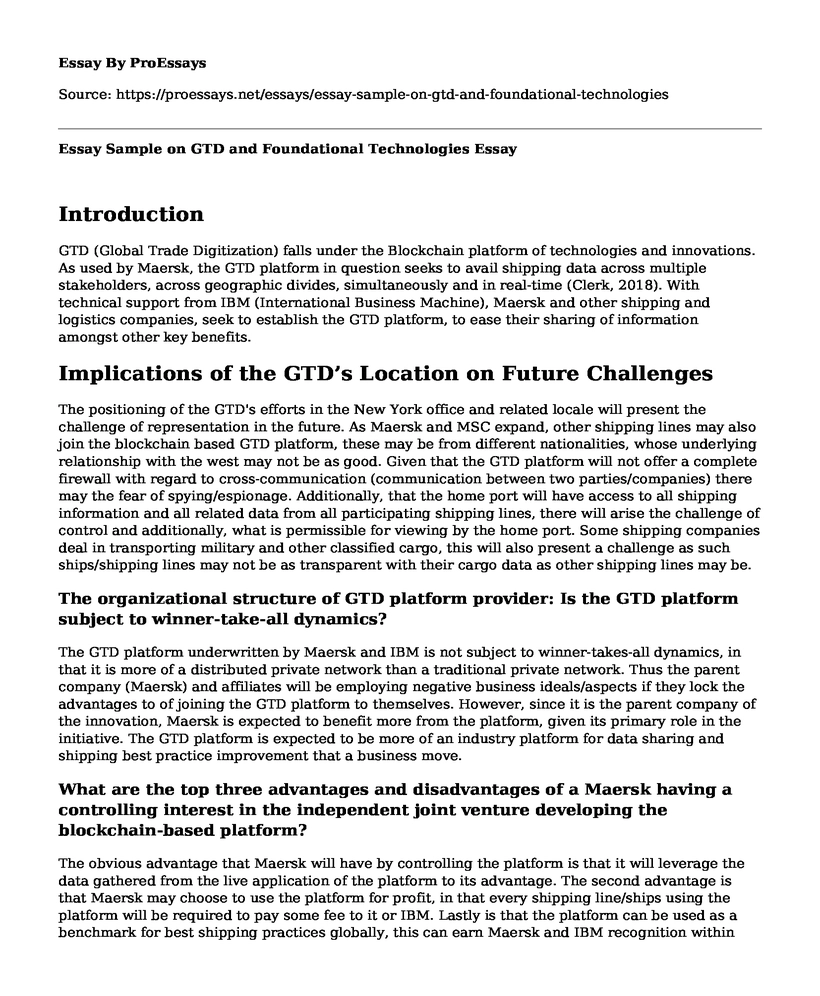Introduction
GTD (Global Trade Digitization) falls under the Blockchain platform of technologies and innovations. As used by Maersk, the GTD platform in question seeks to avail shipping data across multiple stakeholders, across geographic divides, simultaneously and in real-time (Clerk, 2018). With technical support from IBM (International Business Machine), Maersk and other shipping and logistics companies, seek to establish the GTD platform, to ease their sharing of information amongst other key benefits.
Implications of the GTD’s Location on Future Challenges
The positioning of the GTD's efforts in the New York office and related locale will present the challenge of representation in the future. As Maersk and MSC expand, other shipping lines may also join the blockchain based GTD platform, these may be from different nationalities, whose underlying relationship with the west may not be as good. Given that the GTD platform will not offer a complete firewall with regard to cross-communication (communication between two parties/companies) there may the fear of spying/espionage. Additionally, that the home port will have access to all shipping information and all related data from all participating shipping lines, there will arise the challenge of control and additionally, what is permissible for viewing by the home port. Some shipping companies deal in transporting military and other classified cargo, this will also present a challenge as such ships/shipping lines may not be as transparent with their cargo data as other shipping lines may be.
The organizational structure of GTD platform provider: Is the GTD platform subject to winner-take-all dynamics?
The GTD platform underwritten by Maersk and IBM is not subject to winner-takes-all dynamics, in that it is more of a distributed private network than a traditional private network. Thus the parent company (Maersk) and affiliates will be employing negative business ideals/aspects if they lock the advantages to of joining the GTD platform to themselves. However, since it is the parent company of the innovation, Maersk is expected to benefit more from the platform, given its primary role in the initiative. The GTD platform is expected to be more of an industry platform for data sharing and shipping best practice improvement that a business move.
What are the top three advantages and disadvantages of a Maersk having a controlling interest in the independent joint venture developing the blockchain-based platform?
The obvious advantage that Maersk will have by controlling the platform is that it will leverage the data gathered from the live application of the platform to its advantage. The second advantage is that Maersk may choose to use the platform for profit, in that every shipping line/ships using the platform will be required to pay some fee to it or IBM. Lastly is that the platform can be used as a benchmark for best shipping practices globally, this can earn Maersk and IBM recognition within their individual industries.
The disadvantages, on the other hand, include; shipping lines feeling spied on by both Maersk and the U.S. government as their data will be available to both. This may scare away shipping lines from the east and the Asian region. Second is that there is no specific storage site/company for all the data, hence in the case of a data breach, the source of the breach will be hard to trace. The last disadvantage is that the platform may grow beyond its initial usage/capacity, thus present challenges in managing it.
Conclusion
The GTD platform can be very effective in managing shipping information, especially to home ports, which handle massive amounts of cargo every day. The system may be at the forefront in the management of not only data but also personnel if the platform is used as intended. Additionally, basing the platform on a blockchain foundation ensures there is a high degree of security of both data and online identity of all players on the platform. The platform may, however, be constructed by the layers of control established to govern it and the shipping laws of the countries that the varying stakeholders originate from.
References
Luke, F. (2018). Blockchain Explained. Investopedia. Accessed on 5th January 2019 from https://www.investopedia.com/terms/b/blockchain.asp.
Vincent, C. (2018). Maersk: Betting on Blockchain. Harvard Business School. U.S.A
Cite this page
Essay Sample on GTD and Foundational Technologies. (2022, Nov 15). Retrieved from https://proessays.net/essays/essay-sample-on-gtd-and-foundational-technologies
If you are the original author of this essay and no longer wish to have it published on the ProEssays website, please click below to request its removal:
- Research Proposal Example on Online Shopping and Consumers' Privacy Concerns
- Ted Talk: Navigating Our Global Future by Ian Goldin Essay
- Research Paper on Nanotech in Asia Pacific: Promises and Possibilities
- VR Tech: A New Education Tool for Schools & Distance Learning - Research Proposal
- Technological Innovations in Manufacturing - Free Essay Example
- Educational Video Games - Free Essay Example
- Smart Diapers - Free Report Example







